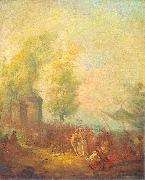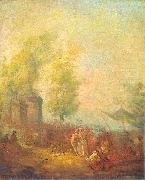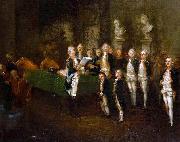Jean-Pierre Norblin de La Gourdaine Oil Painting ReproductionAll Jean-Pierre Norblin de La Gourdaine Oil Paintings(in Polish, Jan Piotr Norblin; 15 July 1745 - 23 February 1830) was a French-born painter, draughtsman, engraver, drawing artist and caricaturist. From 1774 to 1804 he resided in the Polish-Lithuanian Commonwealth, where he obtained citizenship. He is considered one of the most important painters of the Polish Enlightenment. He achieved great success in Poland. Given many commissions from some of the most notable families of the Polish-Lithuanian Commonwealth, he stayed there for many years, not returning to Paris until the early 19th century. His style showed the influence of Antoine Watteau, and combined the Rococo tradition of charming fates galantes and fetes champetres with a panorama of daily life and current political events, captured with journalistic accuracy. He created a gallery of portraits of representatives of all social classes in the last years of the Polish-Lithuanian Commonwealth. |
|||

|
|||
|
|
|||
|
||||||||
| Jean-Pierre Norblin de La Gourdaine (in Polish, Jan Piotr Norblin; 15 July 1745 - 23 February 1830) was a French-born painter, draughtsman, engraver, drawing artist and caricaturist. From 1774 to 1804 he resided in the Polish-Lithuanian Commonwealth, where he obtained citizenship. He is considered one of the most important painters of the Polish Enlightenment. He achieved great success in Poland. Given many commissions from some of the most notable families of the Polish-Lithuanian Commonwealth, he stayed there for many years, not returning to Paris until the early 19th century. His style showed the influence of Antoine Watteau, and combined the Rococo tradition of charming fates galantes and fetes champetres with a panorama of daily life and current political events, captured with journalistic accuracy. He created a gallery of portraits of representatives of all social classes in the last years of the Polish-Lithuanian Commonwealth. |
||||||||
|
|
||||||||
| Gemälde IDENTIFIZIERUNG:: 71925 Fete galante Fxte galante, oil on canvas, 31.8x28.7, Art Gallery in Lviv c. 1785 |
||||||||
|
|
||||||||
| Gemälde IDENTIFIZIERUNG:: 73220 Fete galante oil on canvas, 31.8x28.7, Art Gallery in Lviv Date c. 1785 cyf |
||||||||
|
|
||||||||
| Gemälde IDENTIFIZIERUNG:: 92336 Prince Adam Kazimierz Czartoryski in Corps of Cadets 1770s Medium oil on canvas Dimensions 36.3 X 44.6 cm (14.3 X 17.6 in) cjr |
||||||||
|
|
||||||||
|
| VORHERIGER KÜNSTLER NÄCHSTER KÜNSTLER | |||||||
|
|
||||||||
|
Jean-Pierre Norblin de La Gourdaine (in Polish, Jan Piotr Norblin; 15 July 1745 - 23 February 1830) was a French-born painter, draughtsman, engraver, drawing artist and caricaturist. From 1774 to 1804 he resided in the Polish-Lithuanian Commonwealth, where he obtained citizenship. He is considered one of the most important painters of the Polish Enlightenment. He achieved great success in Poland. Given many commissions from some of the most notable families of the Polish-Lithuanian Commonwealth, he stayed there for many years, not returning to Paris until the early 19th century. His style showed the influence of Antoine Watteau, and combined the Rococo tradition of charming fates galantes and fetes champetres with a panorama of daily life and current political events, captured with journalistic accuracy. He created a gallery of portraits of representatives of all social classes in the last years of the Polish-Lithuanian Commonwealth. |
||||||||
|
|
||||||||
|
KONTAKTIEREN Sie UNS |








